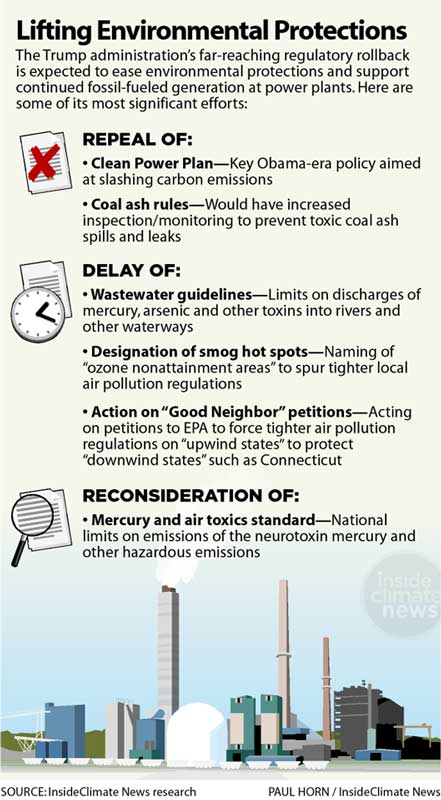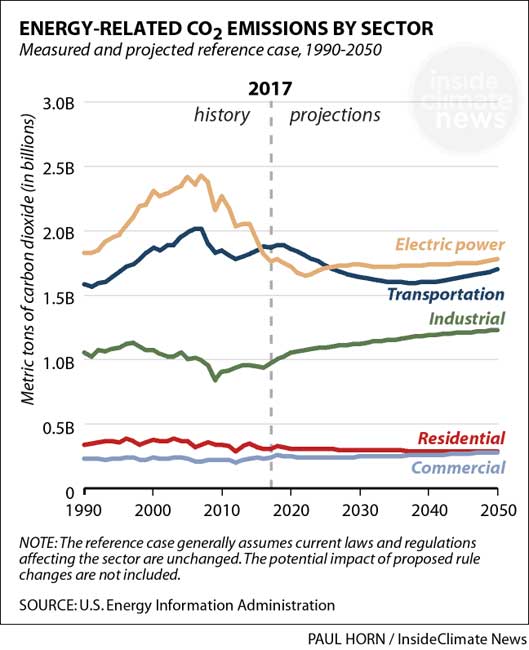[Source: Inside Climate News] Former energy lobbyist Andrew Wheeler said he will continue the deregulatory course set by Scott Pruitt, without the scandals that plagued his predecessor.
In his first Congressional testimony since taking over the Environmental Protection Agency’s leadership in July, Andrew Wheeler tried to reassure lawmakers that the scandal-scarred agency will get a fresh start under his tenure.
But during a hearing of the Senate Environment and Public Works committee Wednesday, Wheeler clearly signaled that he’ll pursue the course of his predecessor, Scott Pruitt, who resigned amid multiple investigations into his mishandling of the agency.
Within days, Wheeler said, the administration will issue a proposed rollback of Obama-era fuel economy and emissions standards, while a new version of the Clean Power Plan could be released to the public in as little as one month.

“We’re continuing the president’s agenda post haste,” Wheeler said.
Lawmakers from both parties praised some of Wheeler’s work during his first weeks in office, noting that, unlike Pruitt, he has published his daily public calendar and opened up events to journalists. Wheeler also has moved to enforce pollution limits on highly polluting diesel freight trucks that Pruitt had sought to undo.
“I am encouraged that there will be a number of differences between Mr. Wheeler and Mr. Pruitt and the way that they approach this important leadership role. For example, I don’t expect to hear as much as a peep from Mr. Wheeler today about used mattress shopping, Chick-fil-A franchises or fancy moisturizers,” said the committee’s ranking member, Tom Carper (D-Del.), taking a crack at some of Pruitt’s alleged transgressions. “But what we do need to hear from Mr. Wheeler today is how he plans to differentiate himself from Mr. Pruitt.”
Wheeler said he had moved quickly within his first weeks, citing relaxed standards for disposing of coal ash from power plants and the implementation of a rule that exempts farms from reporting hazardous emissions.
Both have been roundly criticized by environmental groups but deliver the “regulatory certainty” that industries and Republican members of the committee applauded.
Weakening Fuel Efficiency Standards
Some of the panel’s Democrats pressed Wheeler on the proposed overhaul of the fuel economy standards, a draft of which was published by The New York Times late last week. Hitting the brakes on the decades-long drive to reduce automotive carbon emissions would be at least as significant as the Trump administration’s other main rollback of climate rules—the attempt to dismantle the Clean Power Plan limits on emissions from power plants.

The leaked draft says that regulators will freeze fuel economy standards at 2020 levels through 2026 vehicle model years. The proposal also says EPA will rescind a waiver that allows states to impose higher standards, setting up a potential legal battle between California, which has imposed stiffer standards since the 1970s, and the administration. Twelve states have followed California’s lead.
“Over the lifetime of the current fuel economy standards, consumers will save 1 trillion dollars on gasoline and will keep 12 billion barrels of oil in the ground. That’s the simple formula for fuel economy,” said Sen. Ed Markey (D-Mass.) “You save consumers money and you save the planet at the same time, and that’s why Big Oil is attacking these standards.”
In the draft proposal, the administration assumes that consumers will drive less if their vehicles get lower gas mileage, which it claims would lower the number of fatal crashes—a controversial calculation that Wheeler used to justify the rollback.
When Markey asked Wheeler if more oil would be consumed under the proposal, Wheeler responded: “I believe the analysis shows that more oil would be consumed, but it will also save 12,000 lives.”
Much of Wednesday’s hearing was devoted to the Renewable Fuel Standard, the requirement that a certain amount of corn-based ethanol be blended into the nation’s fuel supply. Several farm state senators took aim at the EPA’s decision to give dozens of waivers to small refineries governed by the standard.
“Over the past year and a half, EPA has taken actions that benefit refiners at the expense of farmers,” said Sen. Joni Ernst (R-Iowa). “They have destroyed corn and ethanol demand.”
Wheeler vowed that the agency would make its decisions more transparent by creating a “dashboard” that tracks the agency’s process. But, he pushed back against Ernst and others, saying, “Part of the original intent of Congress was also to grant the waivers.”
Nary a Mention of Fossil Fuel Ties, Climate Change
Lawmakers devoted surprisingly little time Wednesday exploring Wheeler’s longtime ties to the coal and energy industry, and to allegations that he has lobbied on issues under EPA’s purview within the last two years, in violation of the administration’s own lobbying rules.
“I’ve committed, under both the Trump ethics pledge and ethics regulations to follow ethics guidelines,” Wheeler said. “I’ve not met with any of my clients that I’ve represented for the two years prior to joining the agency.”
Responding to allegations that he recently met with industry executives, he said, “Those weren’t meetings, they were speeches…I can’t control the people who attend a public speech.”
Only one lawmaker mentioned the term “climate change” during Wednesday’s hearing — and, unsurprisingly, the comments came from a coastal Democrat.
“I know you’ve worked closely with industry for a long time and I hope that you will give your very serious and earnest consideration to the concerns of people like me from coastal states,” said Sheldon Whitehouse, (D-R.I.) “We are seeing climate change-driven sea level rise that’s going to require us to redraw the map of my damn state.”
Whitehouse also delivered one of the more memorable lines of the hearing.
“As you know, I viewed your predecessor’s tenure as one characterized by tawdry personal behavior in office, a desire to damage the agency he led, a flagrant absence of transactional integrity and horrible environmental policies,” Whitehouse said. “And I see you as a remedy to three of those four, so in that sense I welcome you.”
On Tuesday, Sen. Jeff Merkley (D-Ore.) and Rep. Gerry Connolly (D-Va.) introduced legislation in the Senate and House — the Ensuring Pruitt is Accountable (EPA) Act — that would halt any rule-making that began during Pruitt’s tenure until the Office of the Inspector General concludes multiple investigations into his conduct.
The legislation was endorsed by 14 environmental groups.
Source: Inside Climate News
August 2, 2018


